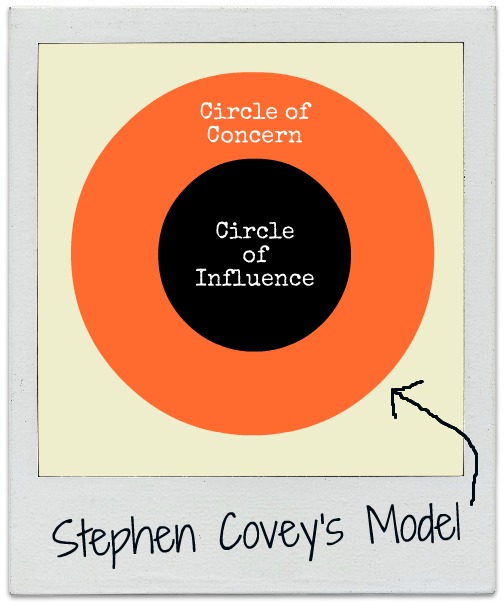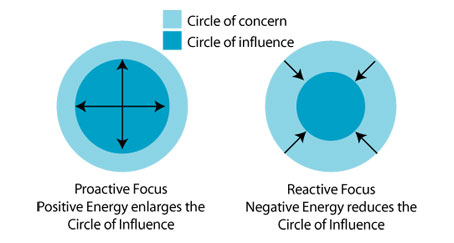You may be familiar with the serenity prayer:
God, grant me the serenity to accept the things I cannot change,
courage to change the things I can,
and wisdom to know the difference.
I think we would all agree with the sentiment; the key to its success is the last line – knowing, appreciating and accepting the difference. That does not mean rolling over and submissively accepting injustice or difficulty. What it does encourage instead is a focus of energy into the places where change can be affected.
Stephen Covey (he of the urgent/important grid from last week), talks about this idea in his Circle of Concern model.

The inner circle is where the magic happens – this is the world we can control and influence and that contains our thoughts, responses, choices, attitudes and actions; as well as our influence on others – through our words and deeds we impact other individuals or indeed groups and society at large. The outer circle, our circle of concern, is a more difficult place to come to terms with. It is those parts of our life or world which have some impact on us, but that we do not influence in return.
Let us apply an example to understand this – our current experience of the global pandemic. The fact that it is happening is obviously having an impact on our lives, but we have no control over the fact that it is here, and that the functioning of our society, as a consequence, is affected. This then sits in our Circle of Concern.
Within our Circle of Influence is our response to that – our emotions and anxieties, the decisions we make about how we behave: how often we FaceTime our family, what old scarf we are choosing to re-purpose into a face covering, whether we love or loathe Joe Wicks, how we structure our day, how loudly we holler at the kids for nicking all the WiFi when we are in the middle of a meeting, how frequently we watch the news and so on. The Circle of Influence also includes actions that affect others – how we share our thoughts on social media, how we talk about our experiences to friends and family, whether we adhere to social distancing rules, how we support those in need in our local community.
Covey suggests that if we focus our positive and proactive energy in our Circle of Influence, we gain more control over our lives and extend our influence – we increase the size of this inner circle. He says: “I am not a product of my circumstances. I am a product of my decisions”. O,r as Albus Dumbledore says, “It is our choices, Harry, that show what we truly are, far more than our abilities”.

Now that’s not to say this is an easy thing to do, however I am sure we can all recognise times when our thoughts and anxieties have taken us down the path of focusing on the “If only it was like that not this, then everything would be better” or “I’m so annoyed with so and so politician/leader/TV character” (yes, we’ve all thought that last one, don’t make out that’s just me…!), “I’m so worried it’s going to rain this weekend and I’ve spent so much time planning this wedding”; and our energy has been sapped by frustration and misdirected emotion. What, perhaps, would it feel like if we were to continue those sentences to re-frame our thinking?
“I am so annoyed with x politician… I am going to write to her and express my frustration/I am going to join a campaigning group/I am going to vote elsewhere.”
“If only it was like that not this then everything would be better…. but it’s not, so I’m going to write a list of the things I am grateful for/small changes I could make/people I could speak to.”
“I’m so worried it’s going to rain this weekend and I’ve spent so much time planning this wedding… so let’s make sure we have lots of umbrellas and rain macs to hand out, and remember I will be surrounded by friends and family so it will be a great day whatever the weather.”
Drawing on our proactive selves; finding ways to recognise and be grateful for any positives – even in difficult situations; reaching out for help and support; moving your energy into your inner circle, can help you regain a sense of agency even in the face of difficult circumstances. These strategies help our personal wellbeing and resilience, and also make us more effective team members, leaders, colleagues and friends.
Juliet Flynn, Organisational and People Development
 People, Culture and Inclusion
People, Culture and Inclusion Juliet Flynn
Juliet Flynn 274
274


